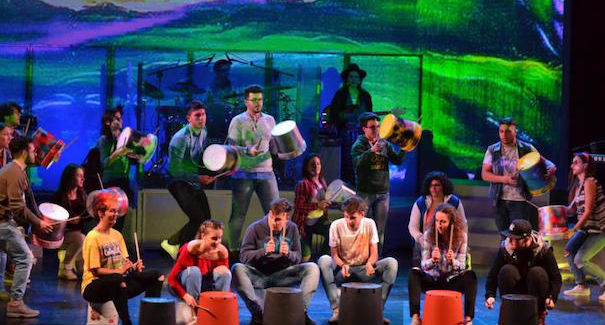Word of Life – August 2017
This psalm is a hymn of glory that celebrates the kingly nature of the Lord who governs the whole of history. He is eternal and majestic, yet he expresses himself in justice and goodness, more like the closeness of a father than the power of ruler. God is the focus of this hymn, which reveals his tenderness, superabundant like a mother’s. He is merciful, compassionate, slow to anger, great in love, good to all … The goodness of God was shown to the people of Israel, but it extends over all that his hands have made, over each person and all of creation. At the end of the psalm, the author invites all living beings to make this hymn their own, thus adding a harmonious chorus of voices to his own proclamation: “The Lord is good to all, and his compassion is over all that he has made.” God himself entrusted creation to the hands of men and women, as if it were like an open book in which his goodness is written. We are called to cooperate with the Creator’s work, adding pages that speak of justice and peace, acting according to his plan of love. Unfortunately, however, what we actually see around us are the many wounds inflicted upon people, often the defenseless, and upon the natural environment. This happens because of many people’s indifference, and the selfishness and greed of those who exploit the great wealth of the environment purely for their own ends and at the expense of the common good. In recent years, the Christian community has developed a new awareness and sensitivity in its respect for creation. In this context, we can recall the many appeals of church leaders encouraging us to rediscover nature as the mirror of divine goodness and the heritage of all humankind. In his message for the Day of Prayer for the Protection of the Environment, on September 1 last year, Ecumenical Patriarch Bartholomew of Constantinople said: “We need to have constant vigilance, information and education in order to understand clearly the relationship between today’s ecological crisis and our human passions … which result in and lead to the current crisis that we face. “Therefore, the only way out of this impasse is our return to the original beauty … of frugality and asceticism, which can guide us toward a more careful management of the natural environment. “In fact, the voracious need to satisfy our material needs assuredly causes spiritual poverty, which in turn culminates in the destruction of the environment.” And in his encyclical Laudato Si’, Pope Francis wrote: “Care for nature is part of a lifestyle which includes the capacity for living together and communion. Jesus reminded us that we have God as our common Father and that this makes us brothers and sisters. “Fraternal love can only be gratuitous … This same gratuitousness inspires us to love and accept the wind, the sun and the clouds, even though we cannot control them … We must regain the conviction that we need one another, that we have a shared responsibility for others and the world, and that being good and decent are worth it” (228–9). Let’s take advantage of time we have off work, or all our our chances during the day, to lift our gaze to the depths of the sky, the majesty of the mountaintops and the vastness of the oceans, or even just to see a tiny blade of grass sprouting by the roadside. This will help us to recognize the Creator’s greatness, the one who is “lover of life,” and to find hope again in his infinite goodness, which surrounds all things and accompanies them. Let’s choose a modest style of life for ourselves and for our families, a lifestyle that respects the demands of the environment and is in keeping with the needs of others. Let’s share the goods of the earth and of our work with the poorest of our brothers and sisters. And let’s give witness to the fullness of life and joy by becoming bearers of tenderness, kindness and reconciliation to the world around us. Letizia Magri Each month the Focolare offers a Scripture passage as a guide and inspiration for daily living. Focolare’s founder, Chiara Lubich (1920–2008), wrote these commentaries for many years. Now an international commission continues this tradition, faithful to her spirituality of unity. Letizia Magri, an expert in marriage and family from the John Paul II Institute in Rome, is head of this commission and part of the Focolare’s center for the family. This Word of Life is translated into 96 different languages and reaches several million people worldwide through the media. This monthly leaflet is also a supplement to Living City, the Focolare magazine (livingcitymagazine.com). For information and to subscribe to this leaflet or to the magazine, write to: Living City, 202 Comforter Blvd, Hyde Park, NY 12538; tel: 845-229-0496; e-mail: livingcity@livingcitymagazine.com. Visit focolare.org (international) or focolare.us (U.S.). © 2017 by Living City of the Focolare Movement, Inc. Read more Coda, Piero (2015) “God and Creation: Trinity and Creation out of Nothing,” Claritas: Journal of Dialogue and Culture: Vol. 4 : No. 1 , Article 3. http://docs.lib.purdue.edu/claritas/vol4/iss1/3 Masters, Thomas and Amy Uelman, “Perspectives on money and material goods,” Focolare. New City Press: Hyde Park, New York, 2011, pp. 146-148. Rondinara, Sergio (2014) “The “Book of Nature”: Connecting Science and Wisdom,” Claritas: Journal of Dialogue and Culture: Vol. 3 : No. 1 , Article 5. http://docs.lib.purdue.edu/claritas/vol3/iss1/5


